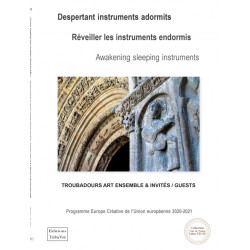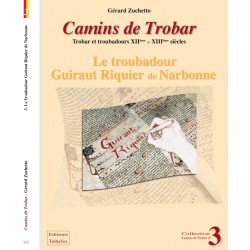Recently added item(s)
Product successfully added to your shopping cart
There are 1 items in your cart. There is 1 item in your cart.
Livre-CD
- New Selection
- Books
- Music
- Videos - DVD
- Miscellaneous
- Revues, Journaux
Links
Art de trobar - Gerard Zuchetto, Troubadours Art Ensemble
L-9791093692395
New
1 Item
Available
20,00 €
Art de trobar - Art of the troubadours - Gerard Zuchetto, Troubadours Art Ensemble. Art dels trobadors, Art des troubadours, Kunst der Troubadours. Recueil quadrilingue de chansons de troubadours écrites entre 1071 et 1292. Collection Votz de Trobar - Libre-CD 3, Tròba Vox.
Data sheet
| Type | Paperback |
| Year | 2021 |
| Duration | 27 titles |
| Language | Occitan, French, English, Deutch |
| Pages | 112 |
| Format | 15 x 21 cm |
| Distributor | Tròba Vox |
| Label | Collection Votz de Trobar |
| ISBN | 979-10-93692-39-5 |
| ISSN | 2729-3068 |
More info
Art de trobar - Art of the troubadours - Gerard Zuchetto, Troubadours Art Ensemble
Art dels trobadors, Art des troubadours, Kunst der Troubadours
Singing the songs of the troubadours
‘‘Interpreting the troubadours, today, poses to all contemporary singers the unavoidable questions of re-creation and of creation : To sing? To recite? To relate ? To play? To improvise? With or without instruments? Which instruments to play, and how? These are among the pressing questions which demand answers from lovers of the Trobar repertory. To these questions must be added, beyond artistic positions, inquiries concerning the reliability of the manuscript sources and of an "authenticity" which must be verified.
It seems to us indispensable to comprehend Medieval iconography and texts in all their visible aspects and in the sense of the words, in order to attempt to arrive at a new idea of the work and of its author, and to bring into the forefront the artistic personality of the troubadour.
Comprehension of the razo (subject) of the poem, with its motz coberts, can determine the orientation of an interpretation of the text's dramatic sense. Awareness of the compas (melody and metrical structure of the poem), as well as the melismatic
ornamentation of a melody, may allow the guidance of rhythm and phrasing of vocal expression toward an optimum word-sonority.
Analysis of the entrebescamen of the poem (words and music entangled, repetition of phonemes and rhymes) can guide the flexibility and the amplitude of the song. The representations of the poets (miniatures and illustrated texts) are indications about gestures and movement.
Knowledge of the historical and legendary context of the poet, by means of the portraits sketched in the vidas and razos, contributes in the most active way toward giving a subjective character to our interpretation and toward influencing our own creation.
From 1071 to 1292, during two centuries, each generation defended the principle of "trobar" and of writing new songs with new melodies ("new" meaning "original"). They put into the spotlight the technique of singing, writing, inventing : maestria and novelty in trobar. The poets affirmed trends in ideas and aesthetic choices. Trobar e chantar are the master-words which should define for us the art and the manner of interpreting the works. This desire for freshness, present in every act of writing, should awake arouse in us curiosity and sensibility. We cannot remain impassible when listening to these great songs, which call out to us with each verse. To interpret them without getting involved in the text seems nonsensical to us. The discreet Bernart de Ventadorn urged his joglar Huguet : Mos cortes messatges, chantatz ma chanso volontiers ! "My courteous messenger, sing my song with pleasure !" Which is to say, with ease, with enjoyment, heartily, willingly, so as to give you joy! The sense of Bernart's instructions cannot escape us. It is the volontary, determined character of an interpretation, supporting itself on the
sense of the text and on its context, which must take precedence, along with the sonority of the words, flexibility of expression and the melodic construction.
Let us go to the source! In order to rediscover the image of Giraut de Bornelh who could "compose" also for humble water carriers. Let us quench our thirst, refresh ourselves, enjoy, delight in words and sounds: when all is said and done, this seems to us to be the best way to sing the repertory of the troubadours.’’ Gerard Zuchetto
Collection Votz de Trobar - Libre-CD03.
Editions Tròba Vox.
Les artistes:
Gerard Zuchetto - Gisela Bellsolà - Jan dau Melhau
Chant / Voice / Gesang - Récitatifs / Recitatives / Rezitativen
Jörn Gruber : récitatifs / Recitatives / Rezitativen
Guy Robert : luth, harpe, saz, oud, orgue portatif / Lute, harp, saz, oriental lute, portativ organ Laute, harfe, saz, arabische laute, tragbare Orgel
Dominique Regef : vièle à archet, rebecs, israj, vielle à roue / Fiddle, rebecs, israj, hurdy gurdy Bogenfiedel, rebec, israj, radleier
Patrice Villaumé : psaltérion, vielle à roue ténor / Psaltery, tenor hurdy gurdy/Tympanum, Radleier
Patrice Brient : vièle à archet basse / Bass fiddle / Bassbogenfiedel
Jacques Khoudir : percussions, tambourin, derboka, bendir / Percussions / Schlaginstrumente
Summary:
Introduction / Einführung 4-5
Razos de trobar
01 Raimon Vidal de Besalú : la drecha maniera de trobar 9
Trobar de maestria
02 Bernart de Ventadorn : intr. cobla Peire d’Alvernha 11
03 Quan l’erba fresche e·l folha par 12-19
04 Non es meravelha s’ieu chant 19-23
05 Peire d’Alvernha : intr. cobla Peire d’Alvernha 23-24
06 Amics Bernart de Ventadorn 25-30
07 Giraut de Bornelh : intr. cobla Peire d’Alvernha 31
08 Reis glorios 32-34
09 Raimbaut d’Aurenga : intr. cobla Peire d’Alvernha 35
10 Ar’resplan la flors enversa 36-42
11 Arnaut Daniel : intr. Divina commedia Dante Alighieri 42
12 Chanso do·lh mot son plan e prim 43-49
Cansos de la fin’amors
13 Raimon de Miraval : intr. cobla Monge de Montaudon 51-52
14 Be m’agrada·l bels tems d’estiu 52-57
15 Raimbaut de Vaqueiras : intr. Razo Raimbaut de Vaqueiras 58
16 Calenda Maia 59-65
17 Peirol : intr. cobla Monge de Montaudon 65-66
18 Atressi co·l signes fai 66-72
19 Uc de Sant Circ : intr. Vida N’Uc de Sant Circ 73
20 Nuls om no sap d’amic tro l’a perdut 74-79
Sirventes !
21 Marcabru : intr. Vida de Marcabru
22 Dirai vos senes doptansa 81-87
23 Peire Cardenal : intr. Vida de Peire Cardenal 87
24 Un sirventes novel volh comensar 88-92
Lo bel saber de trobar
25 Guiraut Riquier : Aquist per drech dever - Suplicatio 94
26 Pois astres no m’es donatz 95-96
27 Volontiers faria 97-102
Bibliographie/Sources/Quellennachweis 103-105
L’auteur /Autor / Author 108
Reviews
No customer comments for the moment.
 English
English Français
Français Occitan
Occitan











